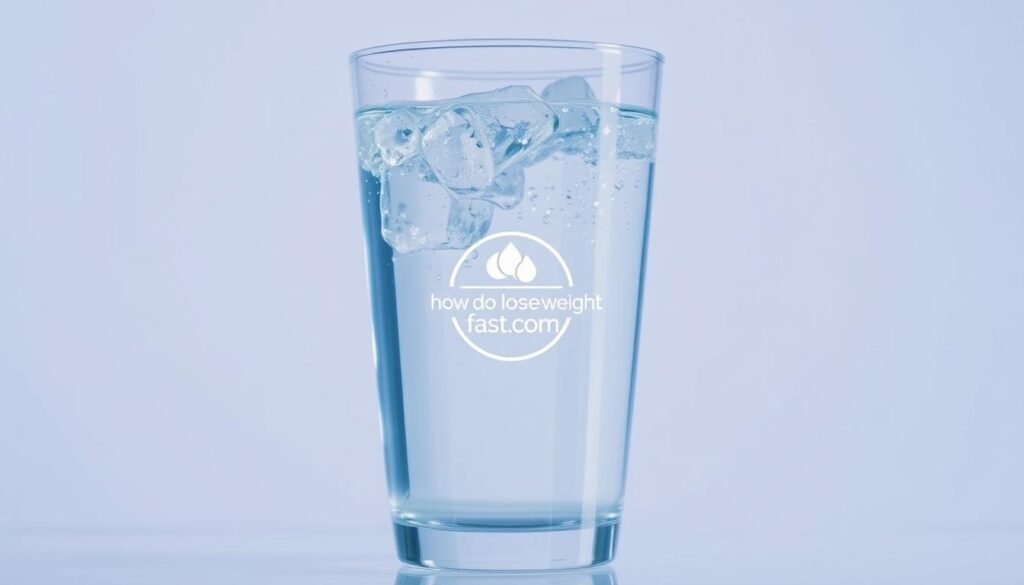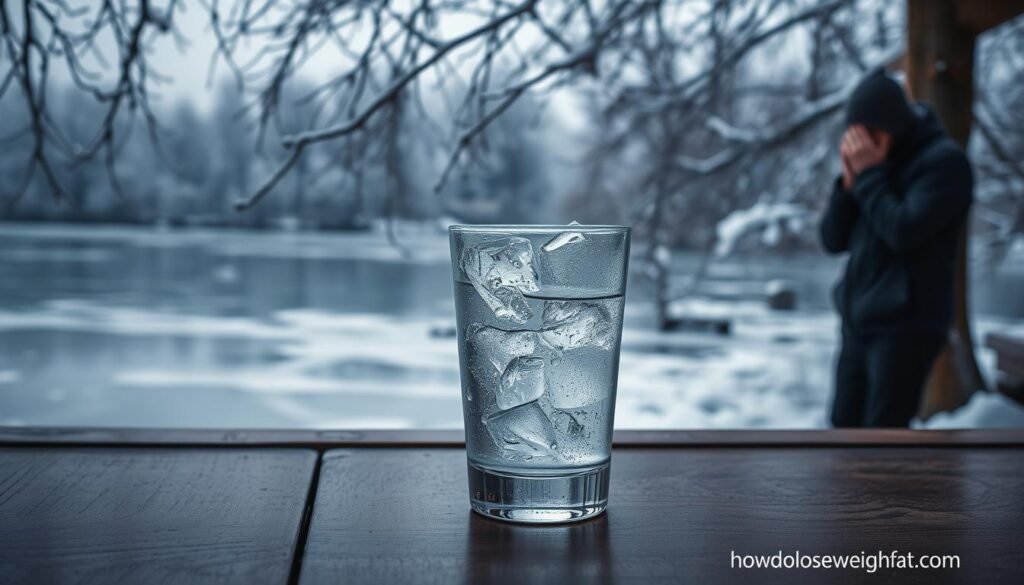Can Drinking Ice Water Really Help You Lose Weight?
As Hippocrates once said, “Let food be thy medicine and medicine be thy food.” This timeless wisdom reminds us that what we consume plays a vital role in our health. But does this extend to something as simple as the temperature of your drink? Many believe that consuming cold beverages can aid in shedding pounds, but is there truth to this claim?
Some argue that your body works harder to warm up cold liquids, potentially burning more calories. Others point to scientific studies that question the significance of this effect. The role of brown adipose tissue, which generates heat, adds another layer to this debate. Is it a myth, or does it hold weight?
This article dives into the evidence, exploring the benefits and risks of cold beverages for weight management. We’ll also compare cold and warm water strategies to help you make informed choices. Let’s uncover the facts and see if this popular belief stands up to scrutiny.
Key Takeaways
- Cold beverages may slightly increase calorie burning as your body warms them.
- Scientific studies show mixed results on the impact of cold drinks on weight loss.
- Brown adipose tissue plays a role in generating heat and burning calories.
- Hydration is essential for overall health and weight management.
- Comparing cold and warm water strategies can help you decide what works best for you.
Introduction: The Role of Ice Water in Weight Loss
Hydration has long been a cornerstone of health, but can its temperature influence your weight? Staying hydrated is essential for energy and bodily functions. A study found that drinking 500ml before meals led to a 1.4kg reduction over 12 weeks. This suggests that timing and quantity matter, but what about the temperature of your drink?
Different cultures have historically used water temperature for various health benefits. For example, traditional Chinese medicine often recommends warm liquids for digestion. In contrast, some modern trends, like the “ice hack diet,” advocate for cold beverages to boost metabolism. This approach claims that your body works harder to warm up the liquid, potentially aiding in weight loss.
Recent statistics show that 61% of Americans have tried cold exposure for weight management. Senior Doctor Đoàn Dư Đạt highlights that consuming cold liquids can increase metabolism by up to 30%. However, this raises questions about the balance between calorie burn and potential health risks.
Here’s a quick comparison of hydration strategies:
| Strategy | Benefits | Considerations |
|---|---|---|
| Cold Liquids | May boost metabolism temporarily | Can cause digestive discomfort |
| Warm Liquids | Supports digestion and relaxation | Less impact on calorie burn |
While cold water might offer a slight edge in calorie burning, it’s essential to consider your overall health and preferences. Combining hydration with regular exercise and a balanced diet remains the most effective approach for sustainable results.
Does Ice Water Help Burn Fat? The Science Behind It
Exploring the science behind cold drinks reveals surprising effects on your body. When you consume a chilled beverage, your system works to warm it to body temperature. This process, known as thermogenesis, requires energy and can slightly increase your metabolism.
For example, drinking 250ml of cold liquid burns about 7 calories. While this might seem small, it adds up over time. Consuming 10 glasses daily could lead to a weekly calorie burn of 490. This is a modest but noteworthy contribution to your overall energy expenditure.
How Cold Water Boosts Metabolism
Your body activates specific mechanisms to handle cold exposure. One key player is the TRPM8 receptor, which detects temperature changes. When activated, it signals your body to generate heat, increasing metabolic activity.
A German study found that cold exposure can boost your metabolic rate by up to 30%. This temporary spike in metabolism is linked to the activation of brown adipose tissue (BAT). Unlike white fat, which stores energy, BAT burns calories to produce heat.
The Role of Brown Adipose Tissue in Fat Burning
Brown adipose tissue is a unique type of fat that plays a crucial role in thermogenesis. Research shows that BAT can burn three times more calories than white fat. This makes it a powerful ally in managing your weight.
Cold exposure also increases adiponectin levels by 20%, improving insulin sensitivity. A 2022 review highlighted how cold-induced fat conversion can support overall health. However, it’s essential to balance these effects with a healthy diet and regular exercise.
While cold beverages offer some benefits, they’re not a magic solution. Combining hydration with a balanced lifestyle remains the most effective approach for sustainable results.
Potential Benefits of Drinking Ice Water for Weight Management
Could your favorite chilled drink be a secret weapon for weight control? Research suggests that consuming cold beverages might offer some advantages for weight management. From reducing appetite to boosting calorie burn, the temperature of your drink could play a role in your health journey.

Reducing Appetite with Cold Water
One way cold beverages may aid in weight management is by curbing your appetite. A Vinmec study found that drinking chilled liquids before meals can reduce food intake by 13%. This is partly due to the gastric stretching effect, where cold drinks temporarily fill your stomach, signaling fullness.
Followers of the ice hack diet report 22% fewer snack cravings. Crushed ice, for example, acts as a zero-calorie snack that satisfies the urge to munch. While this approach can be helpful, it’s essential to maintain a balanced diet and not rely solely on ice for satiety.
Calorie Burn from Warming Cold Water
Your body expends energy to warm cold liquids to body temperature, a process known as thermogenesis. For instance, drinking 250ml of chilled liquid burns about 7 calories. Over time, this can add up—consuming 10 glasses daily could lead to a potential annual loss of 3kg.
Cold beverages also complement exercise by preventing overheating. However, the effects vary based on factors like BMI and activity level. While this method offers a slight boost to your metabolism, it’s not a standalone solution for weight loss.
As with any diet strategy, moderation is key. Replacing meals with ice-only regimens is not recommended. Instead, combine hydration with a healthy lifestyle for sustainable results.
Risks and Considerations of Drinking Ice Water
While cold drinks might seem refreshing, they come with potential risks. For some, consuming chilled beverages can lead to digestive discomfort or worsen existing conditions. Understanding these challenges can help you make informed choices about hydration.

Digestive Challenges with Cold Water
Cold liquids can disrupt your digestive system. For example, a 2001 study linked migraines to cold water consumption. Additionally, 38% of people with achalasia report symptom exacerbation after drinking chilled beverages. Traditional Chinese medicine warns that cold drinks can extinguish “digestive fire,” slowing down digestion.
Vasoconstriction is another concern. Cold exposure narrows blood vessels, which can be risky for those with hypertension. This effect may also strain your heart, increasing the risk of cardiovascular issues like stroke.
Cold Water and Nasal Congestion
Cold beverages can also affect your respiratory system. A 1978 study found that cold liquids increase mucus viscosity, leading to nasal congestion. ENT specialists warn that chronic consumption of cold drinks may worsen sinus issues.
During illness, warm fluids are often recommended for faster recovery. Cold drinks can strain your body’s thermoregulation, especially in extreme temperatures. Instead, opt for room-temperature hydration during workouts or recovery periods.
While cold beverages have their place, it’s essential to weigh the effects on your health. For more insights on thermoregulation and its impact, check out this detailed study.
Is Warm Water a Better Option for Weight Loss?
Warm liquids have been a staple in traditional wellness practices for centuries. From Ayurvedic rituals to Mediterranean diets, the benefits of sipping warm beverages are widely celebrated. But could this simple habit also support your weight management goals?
Warm water is known to stimulate metabolism and improve digestion. A Vinmec study found that warm water drinkers experience 17% better nutrient absorption. This is partly because warm liquids help relax the digestive tract, making it easier for your body to process food.
Warm Water and Digestion
Your body processes warm liquids faster than cold ones. For example, warm water empties from the stomach in about 20 minutes, compared to 45 minutes for cold drinks. This efficiency can enhance your digestion and reduce bloating.
Ayurvedic practices often recommend starting the day with warm water. This ritual is believed to kickstart your metabolism and flush out toxins. Similarly, combining warm water with a Mediterranean diet has shown promising results in managing obesity.
Hydration and Temperature Preferences
Your hydration needs can vary based on climate and activity level. The American Heart Association recommends 3.7 liters daily for men and 2.7 liters for women. However, the temperature of your drink can influence how effectively you stay hydrated.
Some people find warm water more soothing, especially in colder climates. Others prefer alternating between warm and cold drinks to balance their body’s needs. This hybrid approach can help you maintain optimal hydration while supporting your overall health.
For more insights on how temperature affects your health, check out this detailed guide.
Conclusion: Should You Drink Ice Water to Lose Weight?
Incorporating cold beverages into your routine might offer a slight edge in weight management. Research shows that warming chilled liquids can burn up to 490 calories weekly. However, this method is a supplement, not a standalone solution for lose weight goals.
For best results, consider timing your intake before meals and cycling between warm and cold drinks. Gradual implementation, starting with one glass daily, can help your body adapt. Pair this approach with a balanced diet like DASH or Mediterranean for sustainable outcomes.
Remember, extreme practices like ice baths require medical approval. Focus on combining hydration with regular exercise and healthy eating. When paired with lifestyle changes, cold beverages can support your health journey effectively.
FAQ
Can drinking cold beverages boost your metabolism?
Yes, consuming cold liquids may slightly increase your metabolism as your body works to warm the liquid to body temperature, burning a few extra calories in the process.
What is brown adipose tissue, and how does it relate to weight loss?
Brown adipose tissue is a type of fat that generates heat by burning calories. Cold exposure can activate this tissue, potentially aiding in weight management.
Does drinking cold water reduce appetite?
Some studies suggest that drinking cold water before meals may help reduce appetite, leading to fewer calories consumed during the meal.
Are there any risks to drinking cold water regularly?
For some people, cold water can cause digestive discomfort or nasal congestion, especially if consumed in large quantities or during cold weather.
Is warm water more effective for weight loss than cold water?
Warm water can aid digestion and may feel more comfortable for some individuals, but there’s no strong evidence that it’s more effective for weight loss than cold water.
How does hydration play a role in weight management?
Staying hydrated is essential for overall health and can support weight management by helping control hunger and maintaining energy levels during exercise.
Can ice baths help with weight loss?
Ice baths may temporarily increase calorie burn by activating brown adipose tissue, but they are not a sustainable or significant method for weight loss.
What’s the best temperature for water to support weight loss?
The best temperature depends on your preference and comfort. Both cold and warm water can support hydration, which is key for weight management.
Related Posts

Soothe & Slim: DIY Weight Loss Bath Soak
